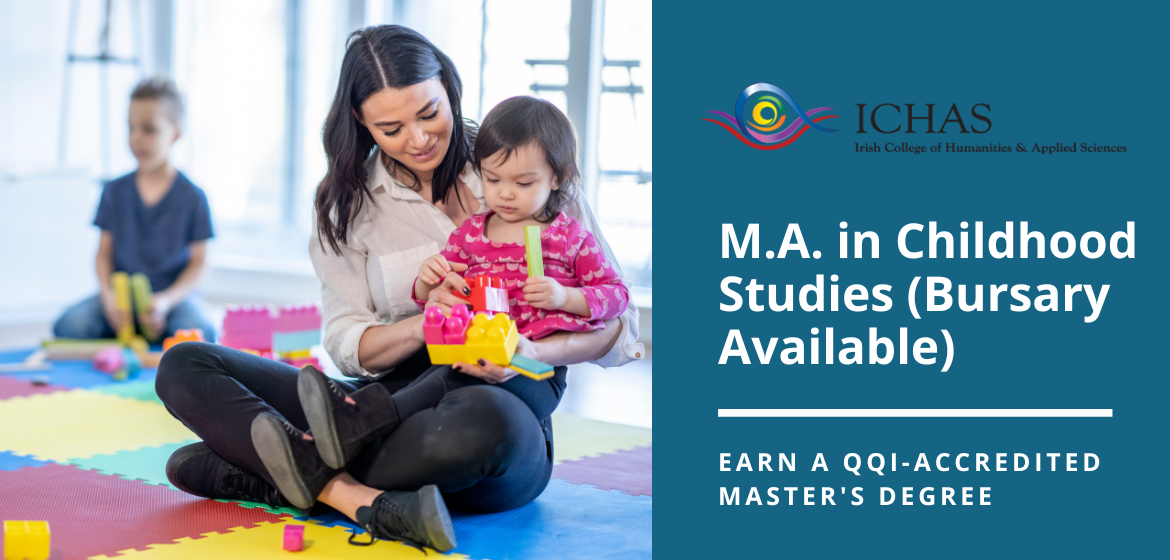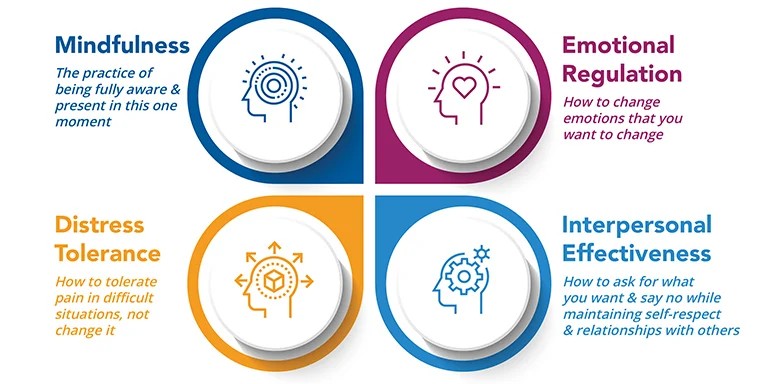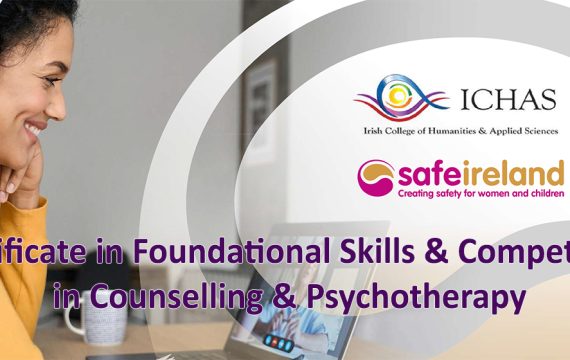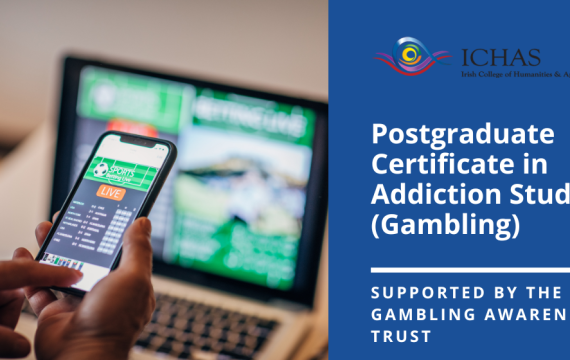
M.A. in Childhood Studies
Bursary information
As part of our affordable access to learning initiative, the college has established a bursary for this programme reducing the cost as outlined below
For details on international fees, please click here
For details on Irish/EU fees please click here
We are delighted to offer you this Master’s programme in Childhood Studies which is primarily designed for graduates in health, human and social sciences related programmes including such disciplines as social care, social work, early years education and care, nursing, Montessori teaching, primary & post primary education, psychology, counselling, psychotherapy, and programmes in cognate areas who wish to study at postgraduate level on either a full-time (over 1 Year) or part-time basis (over 2 Years), who seek to gain specialist knowledge of childhood and youth with a view to expanding their knowledge and understanding of children and young people under the age of 18.
For a brief overview of the programme please click here
-
Award Title: M.A. in Childhood Studies
-
Duration: 1 Year (Full Time) (Evening Programme) 2 Years ( Part-Time)
-
For details on Irish/EU fees and bursaries available please click here
-
Start Date: September 2026
This programme addresses the needs of practitioners and graduates who wish to develop their knowledge and professional competence in areas focusing on professionally supporting childhood development and should be of particular relevance to existing Level 8 graduates of programmes in areas such as Early Learning & Care; Primary & Post Primary Education, nursing, social care, psychology, sociology, social science, youth work and community studies and related disciplines.
This programme has been designed to accommodate the needs of both new and recent graduates as well as those students currently holding positions in the children and young people’s workforce, including those wishing to advance their careers or indeed change careers.
Applicants should be driven by a desire to be professional leaders and agents for collegial support and change; recognising the special contribution that higher education in these fields (using a range of scientifically established paradigms and approaches) can make to professionals involved in supporting children to realise their potential.
Structure of Course
Learners can complete this course on a full-time basis over 1 year and on a part-time basis over 2 years. Attendance would normally require attendance in person (either in class or on Zoom) on 1 evening per week (6 pm to 9 pm) and Saturdays (9.30 am to 4.30 pm) in the academic year from September to July. The timetable has been structured to optimise the utilisation of online learning via Zoom which allows the learner to access classes using on-line facilities.
Learner on the Full-Time route would study and submit for assessment 4 modules in Semester 1 (40 ECTS), while those on the Part-Time Route would submit 2 Modules (20 ECTS) in Semester 1. In this semester learners focus on fundamental Modules associated with the programme. while in addition to this on the full-Time option, are also taught a 10 ECTS Module on Research Methodologies and Design to support them with their Dissertation Module.
On the Part-Time route, this Research Module is taken in Semester 4. The Dissertation Module commences in Semester 1 and is due for completion and submission in Semester 3 for Full-time Students and Semester 5 for Part-Time Students.
In Semester 2, learners on both the Full-Time and Part Time options will complete a total of 30 ECTS of topic focused learning as well as commencing their Practicum module (10 ECTS) and are assessed on this body of work by the end of the First Semester. Students will undertake a minimum of 150 hours of direct engagement in child or adolescent practice in approved settings or engage in other project work associated with such practice during their Practicum module. All learners will be supported with 15 hours of supervision arranged by the College, 10 of which would be mentoring or small group tutoring with 5 hours of direct 1 to 1 placement supervision
Students will complete the Programme on submission of their Dissertation Module at the end of Semester 3 on the full-time route and Semester 5 of the Part-time route. Those students who exit the programme without completion of their Dissertation will be eligible for an Exit Award of a Postgraduate Diploma in Childhood Studies.
The following are the modules that have to be completed on this course which means a total of 90 ECTS have to completed for the Award of MA in Childhood Studies, for brief module aims please click here
| Name of Module | Mandatory / Elective | ECTS (Credits) |
| Critical Perspectives on Child & Youth Development | M | 10 |
| Research Methodologies & Design | M | 10 |
| Curricular & Pedological Approaches in Early Learning & Care | M | 10 |
| Governance & Professional Leadership in Child and Adolescent Practice | M | 10 |
| Contemporary Discourses in Early Learning and Care | M | 10 |
| Practicum | M | 10 |
| Dissertation | M | 30 |
How are learners assessed on this course?
This course has been designed to enable learners to demonstrate their academic and reflective learning in appropriate ways. The assessment strategy comprises a range of assessment tools and approaches to allow for a valid assessment of different learning outcomes as well as for the valid assessment of differing learning styles and situations. Assessment tasks normally include:
- Written Assignments (e.g. Essay, Written Report, Research Proposal)
- Projects (Individual and Group)
- Practical Assignments
- Individual and group presentations
- Terminal Examinations
- Learning Journals or Portfolios
At the start of each academic year, learners will receive a Programme Handbook, which supplements the Student Handbook. The Programme Handbook contains the specific academic information relevant to the individual’s programme.
Within the first week of each module, learners receive relevant assignment briefs for the modules being completed in that semester.
The completion of a research-based dissertation is a central part of the Masters programme and each learner is supported by an academic supervisor for the entire period of their dissertation.
What supports are available to learners
At ICHAS, every lecturer and member of staff is committed to excellence in education and professional practice. Each Module has a Module Leader who works with learners to enhance their learning and will provide formative and summative feedback throughout every module. Each programme has a Programme Co-ordinator and in addition, you will have direct access to the Programme Leader and the Director of Graduate Studies.
The Dissertation and Practicum are central elements of the Masters programme. Each learner will undertake these modules under the direction of an Academic and Practicum supervisor respectively for these modules.
Who Awards My Qualification?
On successful completion of the programme, your qualification is awarded by Quality and Qualifications Ireland (QQI). QQI is one of the principal Irish awarding body for 3rd level education in Ireland and sets the standards for awards on the NFQ. Because this programme is both validated and awarded by QQI, the Award you receive is recognised in Ireland and internationally. See www.qqi.ie for further information.
Where Can I progress to on completion of the course?
On successful completion of the MA in Childhood Studies, learners will be qualified to access Level 10 Programmes on the National Framework of Qualifications (NFQ).
The knowledge, skills, and competence required to successfully participate in and complete this Level 9 programme will normally require applicants to have successfully achieved a Level 2:2 award in a relevant Level 8 degree.
Those who have completed other relevant educational programmes or have relevant professional experience etc., where Recognised Prior Learning (RPL) and Acquired Prior Learning (APL) can be applied to the programme by submission of programme content, qualification, and assignments equivalent to an appropriate Level 8 award at an Honours 2:2 standard, can also be considered. Candidates over 23 years of age who hold significant professional qualifications and or can demonstrate appropriate learning from experiential or other sources of learning may apply through a Recognition of Prior Learning route (RPL). For non-native speakers of English, an IELTS score of 6.5 (or equivalent) is required. Candidates may study on either a full-time or part-time basis.
All applicants will be required to attend for interview to ascertain their suitability for the programme.
In the case of overseas applications, whose first language is not English, applicants will have to provide either certification of completion of a primary degree through the medium of English or submit the official results of English Language competency demonstrated through the completion of English language proficiency tests indicating a minimum score of to B2+ in the Common European Framework of Reference for Languages (CEFRL). Certification may be evidenced through the production of a certificate of IELTS Level 6.5 or equivalent) or equivalent competency tests, if applicable.
All international applicants must meet the visa requirements for study in Ireland.
Successful applicants would be required to complete Garda Vetting at the College.
If you have any queries in relation to this course then please contact the college on 061 216288 or email us at info@ichas.ie. A member of the Admissions team will be happy to assist you
- This programme is congruent with the objective of providing accessible and flexible programmes to adult learners and has been designed with particular emphasis on the use of blended learning technologies to support traditional classroom learning
- This programme supports learners to develop personally & professionally to enable them to achieve a Masters Degree in Childhood Studies.
- Develop learners knowledge, skills & competence to an appropriate level of ‘Higher Order Practice’
- Modules within the programme are designed to build personal capacity, collaborative problem-solving skills, and an understanding of the systems and context within which individuals may be best supported.
- The programme provides a progression opportunity to complete a range of Programmes at Level 10 nationally and internationally.
A central component of the ICHAS vision is the provision of flexible and affordable education for all, with this in mind the college has established a bursary for this programme reducing the tuition fees as outlined below
Tuition fees
For details on international fees, please click here
For details on Irish/EU fees please click here
Click to apply for this programme
Available at our Dublin and Limerick CampusesFeatured Courses

Dialectical Behaviour Therapy
Over 3 evenings the course will look at the background and key aspects of Dialectical Behaviour Therapy and how it can help practitioners to understand themselves and their clients more completely. It will have both didactic and interactive elements and will focus on how...............
FIND OUT MORE
Safe Ireland-Certificate in Foundational Skills & Competence in Counselling & Psychotherapy
The Programme is designed for learners who wish to learn fundamental skills and competencies in counselling & psychotherapy practice.
FIND OUT MORE
Postgraduate Certificate in Addiction Studies (Gambling)
The programme specifically aims to increase practitioner awareness and enhance relevant skills and competencies to engage with those with Gambling Addiction and to support them in their journey towards recovery
FIND OUT MORE





















